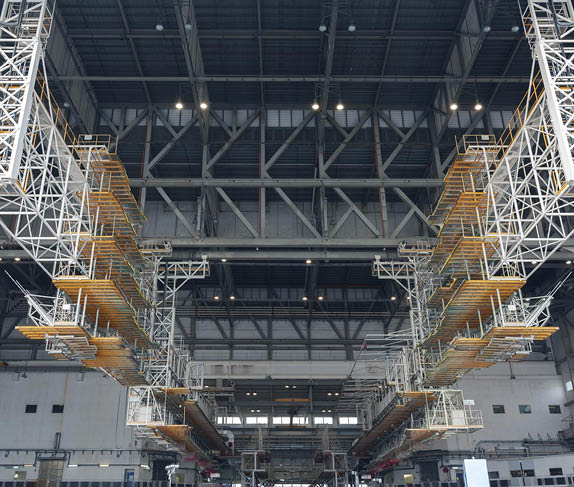Boeing reiterated plans to increase production of its 737 MAX aircraft to 38 per month later this year, with 50 per month rate targeted by 2025-6. However, the manufacturer will need to resolve its near-term delivery delays following another issue with the MAX programme.
In its first quarter results release, Boeing referred to the use of a “non-standard manufacturing process” for two fittings in the aft fuselage of “certain” 737 aircraft. Boeing stressed that this was “not an immediate safety of flight issue” and confirmed that the “in-service fleet can continue operating safely”. That said, there will be an impact on near-term deliveries, said the airframe manufacturer, while necessary inspections and reworks are completed.
Spirit AeroSystems, which manufactures aerostructures for airframe manufacturers including the aft fuselage fittings for Boeing, posted a $281 million net loss in its first quarter earnings due to reach-forward charges on Airbus and Boeing fuselage production.
The company reported revenue of $1.43bn for the three months to end March 2023, but the net loss included $81 million loss on the A220 programme – almost half of which was due to a "distressed supplier," Spirit CEO Tom Gentile told investors in an earnings call. The loss also includes a fix for the Boeing 737 MAX vertical fin issue (two fittings that join the aft fuselage to the vertical tail were not attached correctly during production), which has reduced profits by $17 million as a result of additional repair costs.
Gentile confirmed that the company had implemented a revised process for new deliveries but noted that Boeing may “assert to repair certain models of previously delivered units in their factory and warranty costs related to affected 737 units in service”, which the chief executive said could not be estimated at this time but that the company was working closely with Boeing to minimise the impact.
About 500 in-service 737s are suspected of being affected by the bracket defect.
Spirit expects to delivery fewer units this year, Gentile estimate 390 fuselages for 773 aircraft, which were projected to reach 420 deliveries this year.
Boeing confirmed that it still expects to deliver 400-450 airplanes this year and that its supplier master schedule remains unchanged. The company expects final assembly production to “recover in the coming months”.
Boeing’s backlog is now over 4,500 commercial airplanes.
"We are progressing through recent supply chain disruptions but remain confident in the goals we set for this year, as well as for the longer term," said Dave Calhoun, Boeing's president and chief executive.
"Demand is strong across our key markets and we are growing investments to advance our development programmes and innovate strategic capabilities for our customers and for our future," Calhoun added, with Boeing saying it expected to come out of 2023 cashflow-positive.
Airbus announced in its first quarter results that the ramp-up on the A220 programme was continuing towards a monthly production rate of 14 aircraft by the middle of the decade, with A320-family production on target to reach 65 per month by the end of 2024. The European manufacturer stated that its decision to add a second Final Assembly Line in Tianjin will increase global industrial capacity to 10 Final Assembly Lines for the A320 Family, supporting Airbus' plans to produce 75 aircraft per month in 2026. Airbus has retained its target rate for the A330 to four aircraft per month in 2024 and nine for the A350 at the end of 2025. However, Airbus announced a delay to the delivery of the first A350F with entry-into-service now slipping into 2026.
Production rates announcements are greeted favourably by the industry but it all depends upon whether the OEMs can achieve their current delivery deadlines given the engine issues already discussed.
United Airlines commented in its first quarter results announcement that it now expected delays to its 2023 deliveries. “Airbus notified United that eight Airbus A321neo aircraft scheduled for delivery in 2023 … are now expected to deliver in 2024 and ten Airbus A321neo aircraft scheduled for delivery in 2024 … are now expected to deliver in 2025. Boeing notified United that 37 Boeing 737 MAX aircraft scheduled for delivery in 2023 … are now expected to deliver in 2024.” United further estimated that an additional eleven 737 MAX aircraft scheduled for delivery in 2023 would now deliver in 2024 and 30 Boeing 737 MAX aircraft scheduled for 2024 delivery would be pushed out to 2025.
United has further been impacted by the manufacturing process issue mentioned above that will delay a further six 737 MAX 8s due later this year over into 2024.
On a May 1 earnings call, Air Lease Corporation chief executive, John Plueger, said that in recent weeks the lessor had received “additional notices of delay from both Airbus and Boeing for 2023 and 2024 deliveries” and that the company now fully expects delays to persist for “several years”. Plueger further noted that one “OEM has advised us to expect delays compared to originally contracted delivery dates through 2028, as our delivery schedules are being revised according to their actual ability to achieve production rate increases”.
ALC is a launch customer for the A321 XLR and has repeated seen the timeline for that aircraft entry-into-service push out by 14 to 16 months. Plueger noted the advantage of this unfortunate delay, however: “While clearly frustrating for ourselves and our customers to have delayed deliveries, from a scarcity aspect, this does serve to benefit the value of our existing fleet and the deliveries we are receiving.”

